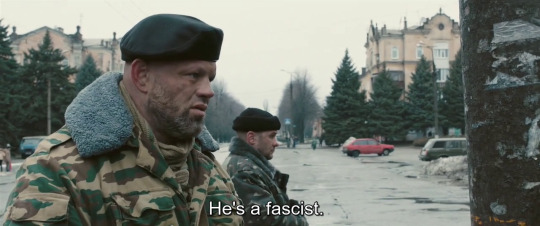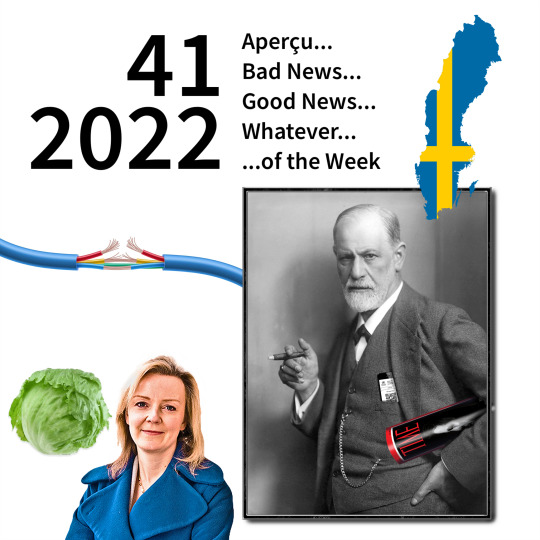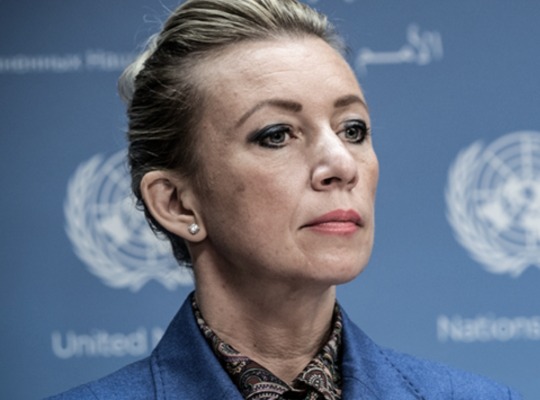#hybrid war
Text
War and Lenin in the 21st century, part 4
By Gary Wilson
The Cold War was a class war between two irreconcilable social systems — imperialist capitalism and socialism. It was called cold because there wasn’t an outright military war. In form, it’s more like what today is called a hybrid war, including extensive covert operations, economic sanctions, cyber warfare, and heavy propaganda. The current economic, diplomatic, political, and military conflict between the United States and China is often called the “new Cold War.”
#new cold war#imperialism#Lenin#global class war#Pentagon#NATO#sanctions#hybrid war#USSR#China#socialism#workers#national liberation#class struggle#Struggle la Lucha
14 notes
·
View notes
Photo





Донбас [Donbass] (Sergey Loznitsa - 2018)
#Донбас#Donbass#Sergey Loznitsa#2010s cinema#Ukraine#astern Ukraine#eastern Europe#drama film#power struggle#Russian invasion of Ukraine#dark satire#dystopia#babushka#political propaganda#hybrid war#societal collapse#Europe#paramilitary batallions#systemic corruption#Vladimir Putin#Volodymyr Zelensky#Joe Biden#European Union#journalists#crime against humanity#warmongers#warmongering#NATO#US imperialism#Russian imperialism
8 notes
·
View notes
Text
Serbia faces hybrid warfare over sanctions refusal, Interior Ministry says
Serbia faces hybrid warfare over sanctions refusal, Interior Ministry says
Interior Minister Vulin says Serbia is being targeted in hybrid warfare due to sanctions refusal – the purpose of this campaign is to force Belgrade to impose sanctions against Russia.
A wave of reports of explosive devices at various sites in Serbia continues, from schools and hospitals to communal units and media editorial offices. All anti-sabotage units of the Serbian Interior Ministry are…

View On WordPress
6 notes
·
View notes
Text

2022 / 41
Aperçu of the Week:
"I once was lost, but now I’m found.
I once was blind, but now I see."
(Amazing Grace, classic spiritual written 1779 by John Newton)
Bad News of the Week:
Sabotage can be an act of warfare. For the past weeks, everyone has been asking who was responsible for the North Stream 1 and 2 natural gas pipelines destroyed by simultaneous explosions. The consensus is that it must have been a coordinated act of sabotage by what is presumably, given its complexity, a state actor. But which state? With what motive? Or terrorists? Everything seemed and seems possible. And then, a week ago, the entire rail traffic in northern Germany was paralyzed when two essential fiber-optic cables for the digital coordination of track occupancy were cut - several hundred kilometers apart. Targeted and compelling with insider knowledge of where and how to strike in order to cause the greatest possible damage with simple means.
Since then, voices have been rising warning of a new scenario: the specific sabotage of infrastructure in order to destabilize. The word "hybrid warfare" is making the rounds. And Bundeswehr General Carsten Breuer, commander of the Territorial Command, explicitly warns that a new kind of situation must be prepared for in today's world: "Here in the command, we are primarily preparing for hybrid threats. That's the state between not quite peace anymore, but not really war yet either." Every citizen, he said, must realize that they need to "change their individual behavior." For example, by buying a battery-powered radio. But also by changing his mental attitude (!). It is hardly reassuring when Breuer also states that "hysteria (is) a bad advisor".
The idea is scary when you think about what happens at home when the WLAN/WiFi goes down for five minutes: there's no music playing in Mom's kitchen, Dad can't get into his online meeting, and the kids complain that they can't watch their current favorite show or "meet" their friends for gaming. But what if the power goes out? For more than an hour? And across the board?
When the railroad company was asked why it wasn't better protected, the answer was short and to the point: cables for communication, signal switching, barrier operation, etc. also run along each of our railroad lines. And these rail lines are 34,000 kilometers long! So effective physical protection is simply an illusion. This is even more true for digital infrastructures. So there's only one thing left to do: include failure and sabotage protection in the planning, for example by means of separate secondary and fall-back systems. And then hope for the best. This also applies in a slimmed-down form to the home. Candles and radio, if you like. But we'd rather leave 300 kg of food cans and camping toilets to the preppers.
Good News of the Week:
Georgia Meloni, the inevitable coming head of Italy's government, has been able to successfully navigate an important personnel issue, thus also proving her assertiveness in the party spectrum. It is about the officially second-highest position in the state: the presidency of the Senate. And this was now awarded to Ignazio La Russa in the first round of voting with an absolute majority. Like his party leader, he makes no secret of his convictions. For example, he proudly shows journalists statues of Benito Mussolini in his living room and advises the use of the Hitler salute because, unlike the handshake, it is contact-less because of Corona. So the takeover of power by the far-right Fratelli d'Italia in Italy seems unstoppable.
Fortunately this seems to be different in Sweden. There too was a clear shift to the right in the last election, with the previously ruling left-wing coalition of Social Democratic Prime Minister Magdalena Andersson being clearly voted out. At the same time, the ultra-right Sweden Democrats received their best result ever, 20.5 %, became the second strongest party and laid claim to government participation. This came as a shock to many observers, as Sweden had always been considered a social democratic model state. But things did not turn out so badly.
About a month after the election in Sweden, the conservative parties Moderate, Christian Democrats and Liberals have agreed on a new government, and Moderate party leader Ulf Kristersson is to be elected prime minister tomorrow. The Sweden Democrats are not part of this alliance, but have announced that they will "support" this coalition without a majority of their own in parliament. A minority government, which would hardly be able to act in Italy, is not uncommon in the Scandinavian country.
In the day-to-day business of politics, therefore, there will be - to put it romantically - an original democratic competition for individual ideas, projects, bills, etc. in parliament. There is no majority coalition that has already set the agenda in a coalition agreement, which then only has to be worked through. Now, each time, support for individual positions must be solicited. This also applies to the Sweden Democrats, who - it has to be said - represent more than one in five votes in the elections and are therefore legitimate representatives of the people, even if it is unpleasant. The hope that pragmatism will continue to rule in Sweden's parliamentary monarchy is therefore justified even after this shift to the right.
Personal happy moment of the week:
Last Sunday, my wife and I picked up the Omicron-specialized Corona Booster. Even though I - who, unlike her, do not belong to a defined vulnerable group - was not yet called upon to do so according to the current recommendation of the German Vaccination Commission. But at the beginning of the cold season and another wave just in Bavaria it seemed reasonable. And then yesterday we gathered all our courage and came out of the cellar back into normal life: we were at a party! For the fifth wedding anniversary of dear friends. With lots of people, lots of conversations, lots of buffet, lots of dancing and lots of beer. And it just felt good - despite a few misgivings in the back of our minds.
I couldn't care less...
...how long Liz Truss will stay in office. Or the lettuce head on YouTube wins: https://youtu.be/Sm-RE95lKJ0. Because the British prime minister is basically down for the count - and clearly so. Her starting conditions may not have been ideal, but she was also beside the will of the people with every single one of her first political decisions. And of the markets, see the dramatic developments of the British pound and government bonds. The resignation of Finance Minister Kwasi Kwarteng as a pawn victim will hardly help her: according to a poll in The Times, only nine percent want to keep her as head of government.
As I write this...
...it is 23 degrees Celsius outside. Mid-October. And the leaves are autumnally colored. "Indian summer" in the middle of Europe. Nice.
Post Scriptum:
Last Sunday, elections were held in Lower Saxony. The fourth largest German state by population and the first heavyweight after the Bundestag elections last fall. And the old prime minister will also be the new one: the Social Democrat Stephan Weil was able to buck the downward federal trend against the Social Democrats SPD. And has certainly benefited from a bonus of office. And his calm, unagitated manner as the father of the state. Two parties have made gains: the Greens, who now have a very good chance of forming a government with the SPD - the desired constellation of both parties.
And the right-wing populist Alternative for Germany (AfD), which almost doubled its share of the vote to 11.6%. The main reasons for their voters are, on the one hand, protest behavior against the established parties and, on the other, "price increases" according to the polls. Pfff... You might as well vote for a certain party because you don't like the weather. But that's how it is in a democracy. Every vote has the same weight, even if a voter's ability to make a politically sound decision may be questionable. But that's the raison d'être of every right-wing party in Europe: I'm dissatisfied with the situation, so I vote extreme in order to criticize "the system". Thanks for nothing.
#thoughts#aperçu#good news#bad news#news of the week#happy moments#politics#amazing grace#sabotage#north stream#germany#Carsten Breuer#hybrid war#railroad#georgia meloni#Italy#sweden#democracy#ulf kristersson#omicron#vaccination#party#liz truss#lettuce#indian summer#lower saxony#elections#ignazio la russa#fratelli d’Italia#right wing
2 notes
·
View notes
Text
I think one of the most important things to remember when you are talking about sensitive topics is that, generally people are stupid. When you talk about war, opression and so on, there are people who have already been subjected to enemy's propaganda. Especially when the enemy is so much bigger with so much more resources. These people don't actually know what you are talking about because to this day they have not even heard about you. So they try to mold your problem to the ones that they understand (e.g. when I talk about russian imperialism the only way some people can conprehend it is to oppose it to western imperialism because to this day they have never even heard about russian imperialism). And because they have never heard about your problem, they are very defensive to prove that it is connected to their own problem, that actually you are the one who's not seeing the whole picture. But the only way to combat this level of lack of knowledge + disinformation is to simply say the truth, to simply talk about it, give facts ect. We cant fix people's lack of critical thinking or the way they rationalize their own arguments but there is no way any argument can win over simple facts.
In any case, Russia is an imperialist and colonialist state. There is no other way around this, those who don't know this simply refuse to learn because Russia surely doesn't hide its past.
2 notes
·
View notes
Text

BRICS Summit in Xiamen, Southeastern China's Fujian Province on September 5, 2017. © Mark Schiefelbein/POOL/AFP
Dmitry Trenin: The Founder Members of BRICS Face a Historic Decision as They Attempt to Reshape the World Order
Expanding the membership and working towards financial independence from the West are two important challenges to be discussed at the Johannesburg summit
— Monday August 21th, 2023
Never has the BRICS group attracted so much interest around the world as in the run-up to the 15th leaders’ summit this week in Johannesburg.
This in itself shows the growth of the bloc's importance since its first gathering – at the level of economics ministers – on the margins of the St. Petersburg Economic Forum in 2006, and the initial proper summit in Ekaterinburg in 2009.
About 20 countries are reportedly seeking admission to the five-member organization and the list of countries that will be represented at the meeting in South Africa is three times as long. This is a sign of the times and points to two things: the yearning of many non-Western nations to become more consequential to how the world is run, and the growing pushback against self-serving Western dominance in global politics, economics, finance, and the media.
This does not mean, however, that BRICS (an acronym made up of Brazil, Russia, India, China and South Africa) will have an easy run in reshaping the world order. Ahead of the Johannesburg summit, two issues emerged as the main challenges to the group’s further evolution. One is expanding membership. A number of countries from all over the globe have lined up at BRICS' door, ready to walk in. These include Algeria, Argentina, Bangladesh, Belarus, the Democratic Republic of the Congo, Cuba, Egypt, Ethiopia, Indonesia, Iran, Kazakhstan, Mexico, Nigeria, Saudi Arabia and the United Arab Emirates. Going for a big-bang enlargement would be a loud statement, to the effect that an alternative to the US-led system of alliances and partnerships is being built. However, the question is would such an expansion make a much more diversified BRICS immediately stronger or not?
Within BRICS itself, views on enlargement differ. Yet, there is a model that can prove useful. Another non-Western group, with some of the same participant states, did manage the enlargement issue without diluting effectiveness. This was the Shanghai Cooperation Organization, which started with Russia, China, and three Central Asian states. Over time, the SCO has found a formula for categories of participating countries and criteria-cum-processes for admitting new full members. The organization was able to extend its full membership to India and Pakistan, Uzbekistan and Iran, with a number of others in line for admission. If the SCO approach is adopted by BRICS, this could be a solution.
The other challenge for the bloc is coming up with new financial instruments to reduce the non-Western economies’ dependence on the dollar. Washington’s weaponization of its currency in its Hybrid War against Russia and its concurrent manipulation of trade and technology against China have made the issue urgent. Western restrictions have hampered the activities of the BRICS’ New Development Bank. Calls have been made for the group to create a common currency, to break the dollar's monopoly in world finance. Yet, it is self-evident that creating a reserve currency for five very different economies, of which China accounts for two-thirds of the combined nominal GDP of the group, will run up against the jealously guarded principle of national sovereignty. The original goal of achieving financial independence will not be met.
A more practical way would be to improve the currently growing practice of using national currencies in trade between BRICS countries. The yuan and ruble account for more than half of Sino-Russian commercial turnover; Russia accepts the rupee for the oil it ships to India; Brazil trades in yuan with China; and so on. While these transactions have the merit of being free from third-country interference, they can and do incur costs, due to the problems with convertibility of some currencies, their limited use outside the issuing country, and the instability of the exchange rate. These are the issues that need to be addressed. While a BRICS currency is still a long way off, it would make more sense to work on improving the system of international payments and settlements within the group.
BRICS is often compared to the G7. Yet, although is some ways the comparison can be justified, the two groups are fundamentally different in their ambition, structure, and evolution. The G7 is politically, economically and ideologically homogenous, while BRICS is rich in diversity on all counts; the G7 is essentially led by the United States, with the others, the ex-great powers, unquestionably accepting that leadership, whereas in BRICS, China’s economic weight does not translate into a Beijing hegemony. The G7 is globalist in the sense of seeking to project its models and morals on the rest of the world, and BRICS countries are wholly focused on their national sovereignty. At the same time, the G7 is clearly exclusive, with the West sitting clearly above the rest, while BRICS is just the opposite: it embraces the diversity of different civilizations and cultures.
The G7’s role is to preserve the old order in which the West is dominant; the BRICS members’ ambition is to build elements of a new, more diversified and better-balanced world order – first of all among themselves and then to further impact the evolution of the world system. BRICS is not an attempt to create a zero-sum alliance. It is the core of what one can call the World Majority that aims at development rather than dominance. The going will be hard and not unopposed but, with more pieces to the puzzle affixed, the foundation of a more open and inclusive world order will eventually emerge.
— Dmitry Trenin is a research professor at the Higher School of Economics and a lead research fellow at the Institute of World Economy and International Relations. He is also a member of the Russian International Affairs Council.
#Dmitry Trenin#BRICS#Founder Members#Historic Decision#Reshape | World 🌎 Order#Summit#Johannesburg | South Africa 🇿🇦#St. Petersburg | Ekaterinburg | Russia 🇷🇺#Brazil 🇧🇷 | Russia 🇷🇺 | India 🇮🇳 | China 🇨🇳 | South Africa 🇿🇦#Egypt 🇪🇬 | Ethiopia 🇪🇹 | Indonesia 🇮🇩 | Iran 🇮🇷 | Kazakhstan 🇰🇿 | Mexico 🇲🇽 | Nigeria 🇳🇬 | Saudi Arabia 🇸🇦#Democratic Republic of Congo 🇨🇩 | Cuba 🇨🇺 | United Arab Emirates 🇦🇪#Shanghai Cooperation Organization#Pakistan 🇵🇰 | Uzbekistan 🇺🇿#BRICS’ New Development Bank#Hybrid War#Hegemonic G7
0 notes
Text
President Putin talking about west and Ukraine and west's hybrid war on Russia
#Russia
#Putin
#war
#conflicts
#west
#africa
#USA
#potus
0 notes
Link
The first casualty of war
#hybrid war#diplomacy#psychological operations#economic warfare#sanctions#deception#propaganda#Ukraine#isolation
0 notes
Link
#ukraine#stand with ukraine#operator starsky#hybrid war#really good info#keeps it simple#has a cute dog named futch#he's adorable
0 notes
Text
Zakharova fiercely called out NATO: "This is a hybrid war"
Zakharova fiercely called out NATO: “This is a hybrid war”
Foto: Shutterstock
Russia’s foreign ministry has attacked the US and Britain for training Ukrainian soldiers, calling it part of NATO’s “hybrid war” against Russia.
Spokeswoman Maria Zakharova said at a press conference that Washington had sent instructors to Ukraine to train Ukrainian soldiers in the use of advanced US HIMARS missile systems.
She added that Ukrainian forces already use…

View On WordPress
0 notes
Text

It's them...the creachur

Also a turnaround for Rainer's tattoos
#battle droids deserved better so I made one that is actually happy :)#and I also have never seen a SW hybrid that isn't half human before so I made a chiss zabrak#so this is all super self indulgent I'm sorry#the B1 is named Paz and their friend is Rainer btw#idk if I'll post more about them or my other OCs so sorry if they don't make any sense xd#star wars#my art#clone wars#star wars oc#paz#rainer
368 notes
·
View notes
Text
War and Lenin in the 21st century, part 2
By Gary Wilson
Vladimir Lenin, the revolutionary leader of the Soviet Union and a key contributor to Marxist theory, outlined his theory of imperialism in “Imperialism, the Highest Stage of Capitalism,” published in 1916. In this work, he identified five key features of imperialism in the early 20th century.
#imperialism#Lenin#Marxism#capitalism#proxy war#hybrid war#finance capital#New Cold War#colonialism#USSR#Big Business#Struggle La Lucha
5 notes
·
View notes
Text
Spain wants to include "southern flank" in NATO roadmap
Spain wants to include “southern flank” in NATO roadmap
Spain will seek to include “hybrid threats” arising on the alliance’s “southern flank” in the NATO roadmap, Spanish Foreign Minister Jose Manuel Albares has said.
A summit of the bloc’s leaders will be held in Madrid from June 28-30, where a new strategic concept for the alliance is expected to be endorsed.
“We want to recognise that there are also serious threats coming from the southern…

View On WordPress
0 notes
Text

I agree with Dawn Syndulla
#Isn't it so great that everyone survived the war and got to live a happy peaceful life and make lots of babies#Kanera#kanera fanart#kanan jarrus#hera syndulla#jacen syndulla#dawn syndulla#kanera kids#twi-lek/human hybrids#singswan-springswan art
262 notes
·
View notes
Text

Yesterday [Feb 15th] was the birthday of my Cathar/Sith Pureblood hybrid Trooper, Embur! (Emburthday? Emburversary? xD) So wanted to draw her! 💪🎉
*Speech bubble says "Anyone seen the rest of my armor?" (The Aurebesh was a random decision lol) Was also debating whether I wanted to draw her all armored up but was too lazy so this scenario came out instead xD
85 notes
·
View notes
Text

Omega and Crosshair’s murder mittens
Hybrid batch: clone force 99 (and omega) are hybrids of Jango and another species
Diathim Omega | Zyggerian Crosshair
#star wars#the bad batch#tbb#tbb crosshair#tbb omega#tbb hybrid au#the bad batch hybrid au#hybrid au
73 notes
·
View notes